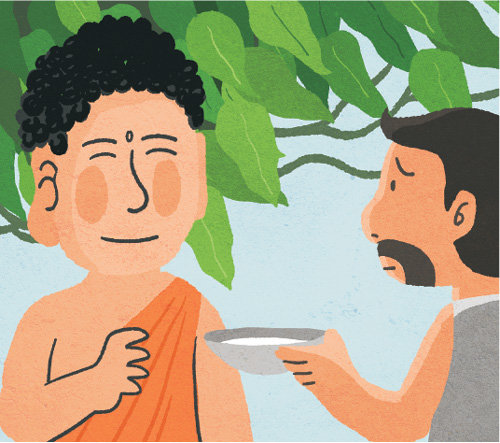A man who plows a field
A man who plows a field
Posted April. 29, 2020 07:32,
Updated April. 29, 2020 07:32

A farmer who plowed a field with a cow served food to his workers during lunch break. However, among those standing in line, one man who didn’t plow the field caught his eye. “You too should plow and sow; and only after having plowed and sown should you eat,” said the farmer, implying that the man didn’t deserve to eat because he didn’t work. To the farmer’s surprise, the man said he too plows and sows.
The farmer felt perplexed and asked on what ground he said so. “Faith is the seed, practice the rain. And wisdom is my yoke and plow. Modesty’s the pole, mind the strap, Mindfulness my plowshare and goad,” said the man, the Buddha. The farmer who believed only physical labor is work learned a new lesson and passed a bowl of milk porridge to the Buddha. However, the Buddha said he wouldn’t take it as he didn’t say such a thing expecting anything in return, meaning offering is not something to be exchanged in return. The Buddha said if the farmer insists he should offer something else. “Then, who should I give this milk porridge to?” said the farmer. “Pour it into the water with no living things,” said the Buddha, adding that the porridge is inedible. The farmer found it ridiculous to waste the porridge, but he followed what the Buddha said anyway. As soon as he poured the porridge into the water, loud noises began with bubbles rising as if one puts a piece of metal heated under a scorching sun into water. It was because the porridge was spoiled – it could endanger one’s life. The farmer confronted the Buddha with such porridge with the rigid logic that one only deserved to eat after labor.
This is a story from “Sutta Nipata,” the first Buddhist scripture featuring a well-known phrase for seekers, “Wander Alone, Like a Rhinoceros.” The Buddha, as his almost contemporary counterpart Socrates did, taught enlightenment through conversations. The Buddha who is described as “the one with open eyes” in the Korean version of “Sutta Nipata” translated by South Korean Buddhist monk Beopjong, was a great teacher opening people’s closed eyes.







